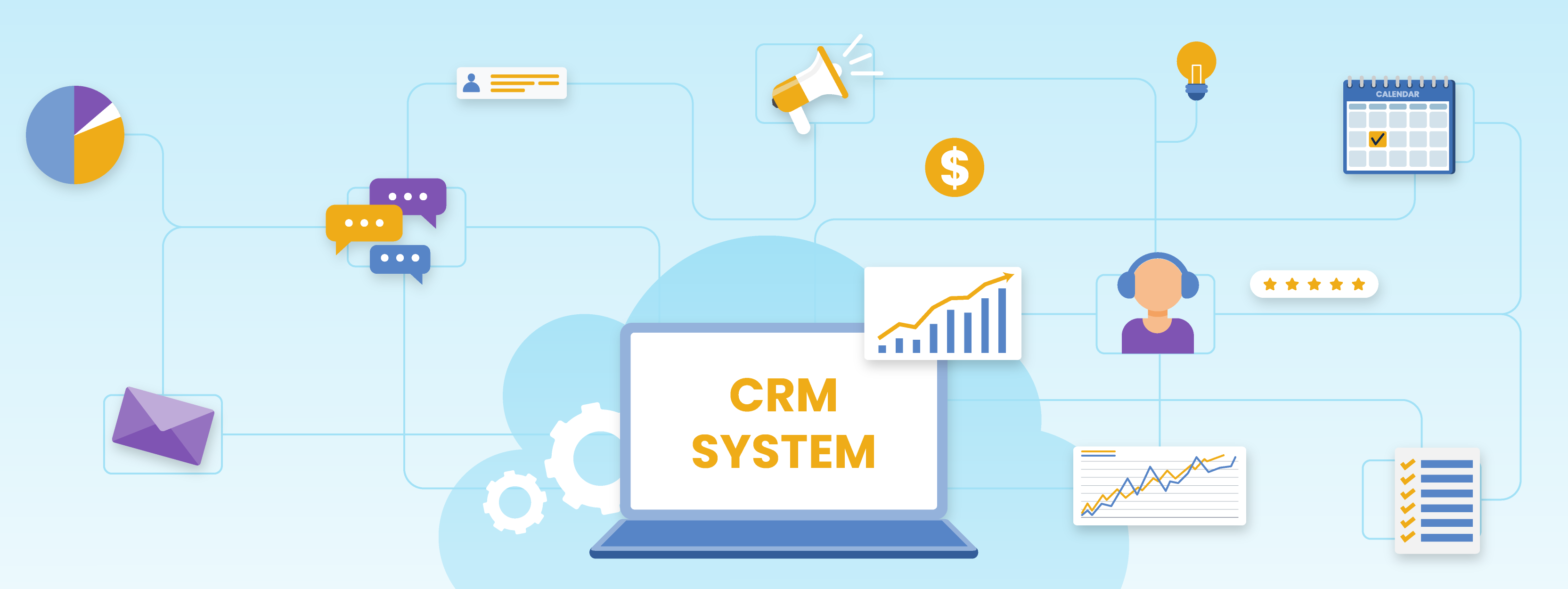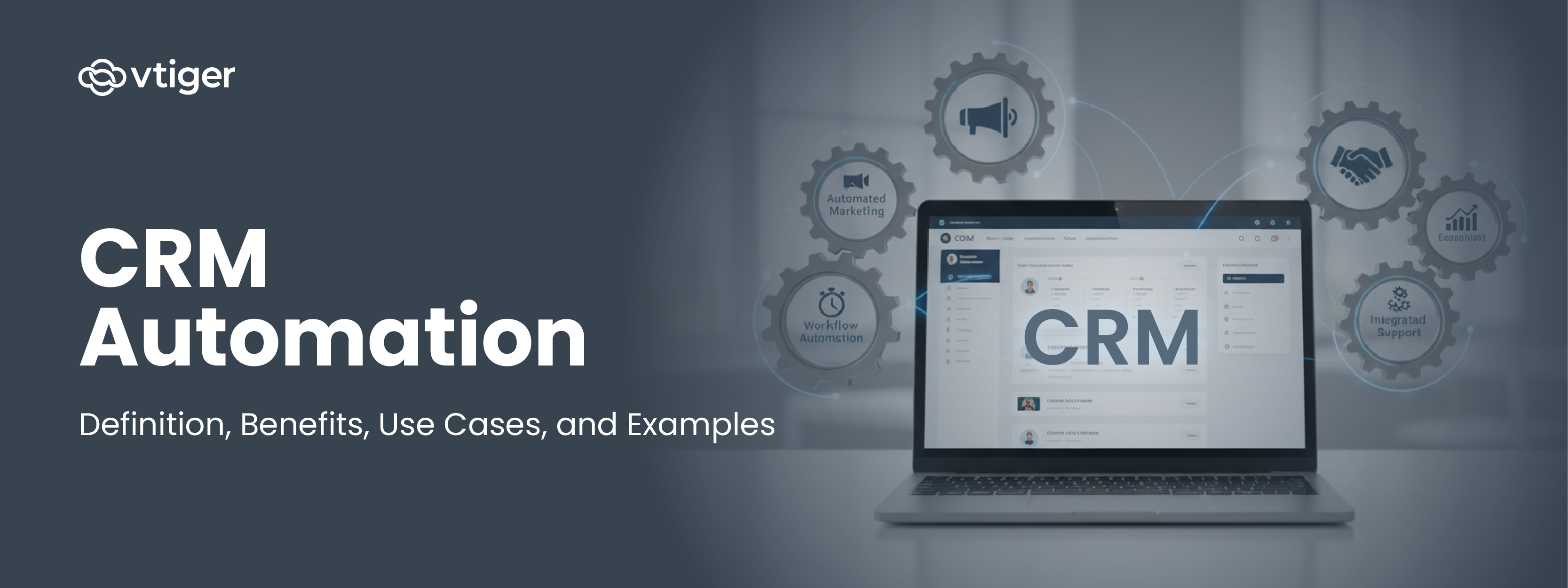A Customer Relationship Management (CRM) system is a strategy and technology that helps businesses manage and analyze customer interactions throughout the customer lifecycle. It involves centralizing customer data, automating processes, and personalizing interactions to improve customer relationships and drive sales. CRMs impact industries by boosting sales, enhancing customer service, improving marketing efforts, and increasing overall business efficiency. In this guide, we’ll explore everything about the CRM system.
What is a CRM (Customer Relationship Management) system?
A CRM (Customer Relationship Management) system is a technology used by businesses to manage and analyze customer interactions and data throughout the customer lifecycle. Today, CRM systems are crucial for businesses aiming to improve customer relationships, streamline operations, and drive profitability. They act as centralized platforms for storing and accessing customer information, facilitating sales, marketing, and customer service activities.
How does a CRM system work?
A Customer Relationship Management (CRM) system is a software solution used by businesses to store, manage, and utilize customer information across departments such as sales, marketing, and support. It brings all customer-related data and activities into one platform to streamline operations by automating tasks and improving customer engagement. Here’s how it functions:
- Data Collection and Storage
CRMs collect information from multiple sources such as website forms, customer emails, phone calls, social media platforms, and offline touchpoints. This information is then stored in a centralized database, allowing businesses to create and maintain structured customer profiles. Most systems allow data validation to reduce input errors and duplicate records, and support permission settings to ensure different users only access the data they need. As the volume of customer data grows, this structure ensures accuracy, accountability, and security across teams. - Managing Customer Interactions
Every communication, whether through a phone call, chat, meeting, or social comment, is tracked by the CRM and linked to the relevant contact or company profile. This interaction history helps teams understand customer preferences, track past issues, and stay informed during every engagement. CRMs also support internal task assignment, deal tracking, and communication timelines, making it easier to manage ongoing opportunities and avoid gaps in follow-ups. Many systems allow lifecycle mapping to track where each customer stands, from lead to loyal client, helping teams act with greater clarity and intent. - Automating Processes
Routine tasks such as sending follow-up emails, assigning leads, updating records, or triggering reminders can be automated through custom workflows. This not only improves internal efficiency but also ensures consistent customer experience, especially when dealing with a high volume of inquiries. Some CRMs go further by supporting behavior-based triggers, allowing teams to automate actions based on customer inactivity, engagement level, or form responses. This removes manual guesswork and improves response time, especially across marketing and support functions. - Improving Customer Relationships
Having a full view of every customer interaction makes it easier to personalize communication and respond with relevance. CRMs enable coordination across departments like marketing, sales, and support – by providing shared access to timelines, notes, and customer goals. Advanced platforms also offer customer scoring, segmentation, and health indicators, helping teams identify which accounts are engaged and which need attention. Over time, this improves retention, increases upsell opportunities, and reduces the risk of customer churn. - Analyzing Data for Insights
CRMs include built-in analytics tools to track sales metrics, service performance, marketing ROI, and user engagement trends. These insights help teams refine their approach—whether that means adjusting campaign timing, optimizing the sales funnel, or reallocating resources based on what’s working. In addition to customer data, many systems also report on internal usage patterns, making it easier to track adoption across the team and address bottlenecks in CRM implementation. These reports ultimately help translate activity into strategy.
Who Should Use a CRM System?
A CRM system is not reserved for any one department. Any team that interacts with leads, customers, vendors, or internal stakeholders stands to benefit. While customer service, sales and marketing often drive CRM adoption, its utility spans further into finance and HR teams as well
Sales Teams
Sales professionals rely on speed, timing, and context. A CRM allows them to prioritize leads, track deal progress, and set intelligent follow-ups without chasing scattered notes or delayed updates. It acts as a live record of every conversation, decision, and proposal. Sales managers can monitor pipeline health in real time and adjust strategies based on accurate deal movement, not assumptions. Forecasting becomes proactive rather than reactive, especially when sales activity is clearly mapped to outcomes.
Marketing Teams
A marketing function built on assumptions struggles to scale. With CRM access, marketers move from broad targeting to personalized engagement. Campaigns can be shaped by actual customer behavior, preferred channels, and timing that matches buyer readiness. The system makes it easier to collaborate with sales by providing unified lead histories, allowing both teams to operate with shared goals and clearer attribution. Tracking campaign influence on revenue is no longer guesswork when metrics are directly tied to each customer record.
Customer Service Teams
Customer service is more than solving queries. It is about context and timing. With a CRM, support agents view complete customer histories before engaging, which cuts repetition and improves satisfaction. Detailed records also help agents spot friction points or potential upsell conversations. Service workflows can be standardized, tickets resolved faster, and customer trust built through better continuity across channels and representatives.
HR and People Operations
HR teams that manage recruitment, onboarding, and internal communication can benefit from CRM principles. Candidate pipelines are easier to organize when every applicant touchpoint is tracked. Onboarding tasks, contract approvals, and internal updates can all be stored and managed centrally. This also improves alignment with payroll, compliance, and training units without back-and-forth emails or document mismatches.
Supply Chain and Fulfilment
Supply and logistics teams operate with strict timelines and tight coordination. CRM systems help track vendor interactions, order requests, delivery updates, and client feedback within a structured system. With visibility into purchase history and communication logs, planners can make informed decisions around stocking, demand planning, and customer commitments. Teams can detect recurring delays, optimize delivery routes, or adjust timelines before issues escalate.
What does a CRM System do?
CRM systems are good at managing customer relationships and improving interactions by creating a unified system. It allows you to record comprehensive details about a customer in a single location, making it easy for different teams to access and update information. By centralizing data, you can track activities and deliver personalized customer experiences.
Besides customer management, CRM offers robust tools to support sales, marketing, and service teams. These tools are important to speed up your work and improve productivity.
Types of CRM systems
Not every CRM is the same. Different types of CRM have unique sets of features that serve different purposes. Your choice of CRM depends on your specific business goals, needs, size, etc. Having a thorough knowledge of the various types available will enable you to make the best decision. So, here are the different types of CRM that you may consider for your business:
On-Premise CRMs
On-premise CRMs are installed on a company’s server. It comes with full data control option and customization, which is ideal for industries with strict compliance needs. But, you will need a dedicated IT professional for regular maintenance, security, and updates. It also involves higher costs but can provide long-term benefits.
Cloud-based CRMs
Cloud CRMs are hosted online and offer remote access and scalability. You can access them through the internet, store important information in the cloud and retrieve them at the time of need. These CRMs are ideal for remote workers. Cloud CRMs also integrate with third-party applications and can expand functionalities as per your requirements.
Industry-specific CRMs
Industry-specific CRMs are designed to meet the unique needs of various sectors such as banking, technology, etc. Unlike general CRM solutions, these types do not require extensive customization. You can also utilize industry analytics to monitor customer behavior and emerging trends. Although they might come with higher costs, these CRMs can offer long-term value.
All-in-one CRMs
The all-in-one CRMs are one of the best CRM solutions for daily operations as they offer a wide range of features. It includes sales automation, marketing campaigns, project management, etc., and allows you to centralize data to get a 360-degree view of customer interactions. This helps each team to collaborate effectively and make data-driven decisions.
What are the features of a CRM System?
Ever wondered why you need a CRM in the first place? Besides helping businesses manage data and customer relationships, organizations mainly use CRMs because of a wide range of features and tools. These tools are designed for specific tasks. Let us understand the top CRM features now:
Contact Management
One of the standout features of a CRM is contact management. It allows you to organize customer information in a single location. With contact management, you can quickly access data, track conversations, and store a detailed history of each customer. This way, you can ensure your team has the latest information readily available.
Marketing Automation
You can leverage marketing automation features such as email campaigns, social posting, lead scoring, nurturing and so on to automate your marketing activities. One key benefit of the marketing automation feature is that it enables you to personalize interactions based on customer history. You can also save time and bring better collaboration between the sales and marketing team.
Lead Management
This feature in CRM aids in tracking leads and opportunities through a lead management system and an opportunity management system. Monitor core sales activities such as team performance, manage pipelines and predict sales goals accurately.
Artificial Intelligence
An AI-powered CRM can automate your daily activities, such as data entry and lead scoring and enable you to focus on high-priority tasks. One of the advantages of integrating AI in CRM is you can gather insights into customer behaviour and trends that can help you in making smart decisions.
Customer Support and Service Management
It is an essential feature of a CRM system to improve overall customer experience by providing effective service. Track customer inquiries and complaints from a centralized location, integrate various communication channels and ensure all customer queries are resolved on time.
Reporting and Analytics
It is an inevitable feature in a CRM system, allowing businesses to make data-driven decisions. Reporting tools allow you to generate detailed reports by analyzing important data, companies can identify trends, pinpoint areas of improvement, and track the success of their strategies.
What are the benefits of a CRM System?
You should have a clear understanding of what CRM is, its types, and key features. A CRM helps you strengthen customer relationships and optimize business activities. Whether you want a specific type or feature, a CRM offers great advantage for driving growth. Now, let’s talk about the benefits of CRM:
Improved customer satisfaction
You can boost customer satisfaction by driving personalized interactions and predicting customer needs from recorded information. With features such as lead management and customer support, you can nurture leads and provide timely customer responses, further boosting satisfaction levels.
Increased sales and efficiency
By centralizing data, the sales team can easily access information, allowing them to focus more on selling and less on admin activities. If you leverage AI, you can automate processes such as lead assignments, follow-ups, etc., and ensure no potential leads are missed.
Better collaboration
CRM systems pave the way for improved collaboration by ensuring all teams remain on the same page with the latest information. This transparency reduces communication gaps, leading to more coordinated strategies. Moreover, CRM systems also improve collaboration through integrated tools like shared calendars and in-app messaging.
Better customer retention rates
CRM systems can track customer history, including past purchases, support tickets, and communication logs, allowing sales and service teams to understand each customer’s unique needs and preferences. This personalized approach helps you build stronger relationships and enhance customer satisfaction, making it less likely for customers to switch to competitors.
How do you know a CRM System is effective
There are many ways to gauge a CRM system’s effectiveness. You can consider factors such as:
- Improved Sales: CRM system allows you to nurture leads and manage relationships effectively. With lead tracking and personalized recommendations, you can increase conversion rates.
- Increase in Efficiency and Productivity: AI can automate many activities, allowing you to get more things done in less time.
- Better communication and collaboration: When teams can access every piece of information from a single place, it becomes easier for them to communicate more effectively with the customers.
How to choose the right CRM system
Selecting the right CRM is important for maximizing benefits and aligning with the business needs. Here are the key steps to consider while choosing a CRM for your business:
- Evaluate specific requirements and goals: Consider the business size, complexity of your business process, and features that are required for your operations.
- Assess the features: Understand the features provided by your CRM system. Look for core features such as contact management, marketing automation, pipeline tracking, and report generation. Also, check advanced features like integration and customization options.
- Usability: A CRM that is difficult to use may lead to low adoption rates among your team. Read reviews from other businesses in your industry and gain valuable insights into the reliability of CRM solutions.
- Scalability, Security, and Support: As your business expands, you will need a CRM that can grow with you, providing more features and capacity when necessary. Security is very important, especially when dealing with sensitive customer information, so make sure the CRM follows relevant data protection laws.
Why Choose Vtiger?
Vtiger CRM can be an ideal choice for businesses who are looking for robust and flexible CRM solutions. It offers extensive customization, enabling organizations to tailor the software as per their requirements. In addition to that, it also offers a suite of features to streamline sales, marketing, and customer support activities. Let’s explore the reasons why someone might choose Vtiger over others:
Cloud-Based
How to choose a CRM depends on your business needs and preferences. Nowadays, most organizations prefer cloud-based CRMs as they allow you to access data from anywhere with an internet connection. This eliminates the need to have on-premise infrastructure and offers automatic backups.
AI Capabilities
With built-in AI capabilities, Vtiger helps businesses make smarter decisions and boost efficiency. Use Vtiger Calculus AI to forecast sales, automate repetitive tasks, and provide recommendations based on customer interactions. This way, you can ensure your team is focused on high-priority tasks while AI handles your routine activities.
Customizability
Vtiger provides extensive customization options, enabling businesses to customize different fields and modules. You can personalize your workflows and automation rules to align with your specific processes. This flexibility allows for a more tailored approach to managing customer relationships.
Integration Options
Vtiger CRM seamlessly integrates with a wide range of third-party applications that include email, accounting, and communication platforms, along with payment gateways. This allows businesses to connect their existing tools with Vtiger, streamlining workflows and enhancing productivity.
Conclusion
A CRM system shapes how internal teams operate, respond, and grow with consistency. It connects departments that often work in isolation and turns scattered data into usable information.
As customer expectations shift and operations scale, businesses need tools that adapt without slowing things down. CRM systems offer that flexibility, provided the choice aligns with actual workflows and objectives. The goal is not just to manage relationships, but to make every interaction, follow-up, and decision easier to execute. And with the right setup, a CRM becomes a stable part of how a business functions day to day.
Frequently Asked Questions
A CRM system is a software tool that helps your organization manage customer relationships. It stores customer data, tracks communications, and automates core business processes in a centralized location. With a single customer view, you can boost team efficiency and improve decision-making to drive business growth.
The key features of a CRM system are contact management, lead management, marketing automation, integration with artificial intelligence, and more. Besides, it also includes collaboration and communication tools to engage with your customers as well as team members.
CRM systems benefit businesses by streamlining sales, marketing, and customer service and managing business relationships. Using a robust CRM, you can improve customer satisfaction and elevate business growth through better data insights, efficient processes, personalized interactions, and stronger customer retention.
There are four main types of CRM systems: On-premise CRMs, hosted on company servers for full control; Cloud-based CRMs, accessible online for flexibility and scalability; Industry-specific CRMs, tailored to meet unique business needs; and All-in-one CRMs, combining sales, marketing, and customer service in one platform.
A CRM system can improve business relationships by centralizing data. When you collate all important information in a single location, you can track interactions and personalize communications accordingly. Automated follow-ups, AI-driven insights, and multichannel supports leads to improved customer relationships.
The sales team uses it to manage leads, automate sales follow-ups, and forecast revenue. Marketing team leverages it for running targeted campaigns, lead nurturing and analyzing customer behavior. Finally, service teams rely on CRMs for ticket management and providing personalized support.
Consider usability to increase adoption rates, scalability to ensure the CRM grows as your business expands, integration capabilities to improve business processes and customization options to tailor the CRM as per your business needs.
A cloud CRM operates over the internet and offers accessibility, allowing teams to work from anywhere in the world. It eliminates the need for hardware and maintenance, and you can set up automatic updates to get access to the latest features and security. Also, inbuilt security and backups can protect sensitive information, reducing the risk of data loss or breaches.
Integrating artificial intelligence into CRM can help you automate routine tasks and enable you to focus on other priority activities. Forecast sales, customer behavior and preferences and be involved in making better decisions. Gauge customer sentiments with sentiment analysis and tailor customer interactions accordingly.
Due to its all-in-one functionality that combines sales, marketing, and customer support, Vtiger stands out in the CRM ecosystem. Its AI-powered features, third-party integrations and user-friendly interface make Vtiger CRM a top choice for business.



